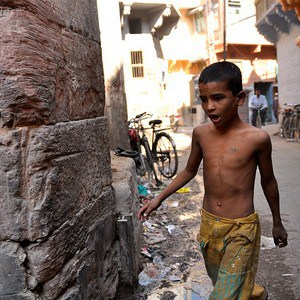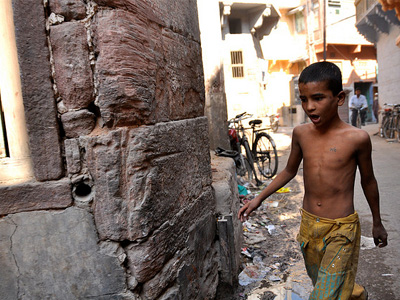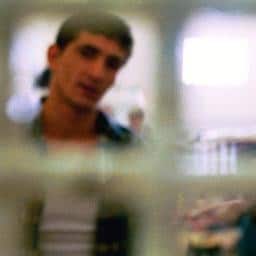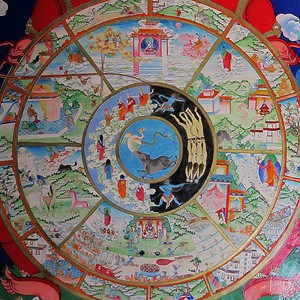Street kids
By G. S.

There are nine kids in my family. We all have different fathers, and none of us have graduated from high school. As a girl, my mother was molested by her stepfather and his friends. As a teenager, when she told her mother, her mother wouldn’t believe her and sent her away to a convent for so-called wayward girls. She was abused in this cloistered environment by both nuns and priests, physically, sexually, mentally, and emotionally. I understand why she was confused as an adult.
As a child I had very racist ideas. My family life was chaotic and the last straw was when my mother got a new man, an African-American man, and for me this was seen as total betrayal. Add to this that she demanded with threat of physical violence that we call him “Dad.” I was 13 years old, and in my mind, my mother died on that day. That night, I left, never to return.
I went to the streets where I found many kids, boys and girls who came from similar situations. Today I can see that this became my new family unit. This was also the time that I was introduced to sex and drugs and rock-and-roll, just like the song says. This became our mantra. No girl was with the group unless she “put out.” We all got caught up in our mantra and did whatever we did to get the money to party—rob, steal, sex, con, etc. whatever.
About a year after I left home, I saw my mother in downtown Cleveland. She didn’t even ask if I was okay. All she said was I had made my choice and I should not tell the welfare people I no longer lived at home. Now remember, she’s telling this to a boy who was just barely 14 years old. Yes, this hurt very much. But emotion was weakness; no room for such luxuries.

The hard surface street kids show is a defense mechanism developed as a result of necessity, for the kids’ survival. (Photo by Shreyans Bhansali)
Most people have the wrong impression of kids on the streets, thinking that they are cocky, aggressive, and rebellious. While on the surface this is the appearance, one must realize that on the streets these are defense mechanisms that have developed as a result of necessity, for the kids’ survival. These kids are in the dark underbelly of a mean, hurtful, adult society that seeks these children out to exploit and abuse. So they are the way they are because of the way they have been treated by their families, relatives, and society. In their minds, no adult can be trusted, as eventually they will hurt you. So it is better to be a part of a group, a gang, as a surrogate family whom you know will cover your back and you cover theirs. Eventually it becomes a matter of us vs. them, of us getting them before they get us.
I lived on the streets as a result of my home life, the abuse and loose ways of my mother pushed me out. My father was long gone. The kids I associated with were all of the same ilk. All of us were distrustful, even paranoid of adults and of society in general. This was especially true of the girls, because they were much more vulnerable to the abuse of adult men. Granted we boys in the group exploited them in a sexual sense, but at that time none of us saw it that way. We saw each other as a safe harbor, so to speak.
I can remember waking up in an abandoned car with a jolt, disoriented, and then looking around and seeing the girl I was with the night before and experiencing a feeling of warmth. She became my “ward” and I hers, and we were the wards and also the protectors of the bigger circle of street kids. All others were shut out and not to be trusted under any circumstance. The lessons of the streets, of being caught alone in a dark alley and beaten up by laughing drunk men or being exploited for our labor and laughed at by adult women or the girls being gang raped and beaten by men. No, we were the only ones we could rely on.
Society had the answer—lock ‘em up. The only problem with this philosophy is the places they sent us were often worse than the streets we came from. More anger builds, more education is gained in the way of survival and when we are released —and we all will be released one day—the anger, violence, indifference, and apathy is then released on society tenfold.
I’ve done many things in this life that I am not very proud of, especially during my days on the streets. I was a very angry, paranoid teenager, who loved drugs and alcohol, substances which further fueled my negative attitudes. Through my eyes back then, I couldn’t see the helping hands of certain adults who were genuinely trying to help. Instead, all I could see were their ulterior motives.
Every adult is a potential threat. Why? Because it’s easier to see all adults in the same light. If they are all seen as potential threats, then none of them can get close enough to hurt you. A grown man can do a lot of damage to a kid. So it’s easier, and from our point of view (at that time), wiser, to be suspicious of them all.
From our viewpoint, there were never any kind adults, because we never allowed any adult to get that close to us. We street kids are the survivors of the violence and abuse of adults, especially the adults in our homes, who are supposed to be the more trustworthy ones. Everything in relation to adults is then seen through the filter of past violence and abuse dumped on us by adults.
We got food by stealing it, or we ate out of dumpsters from restaurants and stores that throw away perfectly good food—they have to discard it because it was not served or the expiration date had past. We also bought food with the money we gained through our criminal activities—robberies, selling stolen property, etc.
We slept in burnt out or condemned buildings, junked cars, under a porch, in the park, wherever we could.
The group had rules, and our goal was simply to survive. So the rules were that everything we did was done with the “family” in mind. We looked out for each other; we protected each other; we comforted each other. If one of the “family” did something that jeopardized the well-being of the family, they were quickly and without question dealt with. This was done with regretted violence. Usually the entire group would join in on beating them and leaving them there unconscious. This was the only way such things could be dealt with. After all, we couldn’t let it out that we were soft. No, the word on the street had to be that if you crossed us, you would pay dearly. Only one transgression was ever permitted. After being beaten, you were on your own. No exceptions. Our survival depended on it.
Sometimes the authorities would pick us up. Yes, several times they did. Sometimes they would not take us to jail. Instead these cops would take whomever they caught to the warehouse district, “The Flats,” and beat the hell out of them with their fists, boots, and nightsticks. I got this twice, car 211, 2nd district. They beat me up pretty bad, closed one of my eyes—I still have the knot on my forehead from them. Their beating had me urinating blood for a week. But I was lucky, as they only caught me twice. It was a game to them. It was survival to us.
The longest I ever spent in a juvenile facility was eight months. Usually they would just cut me loose the following day and tell me to straighten up and go home. Well, that wasn’t going to happen.
These kids don’t know who they are and where they belong. When your inner life is a place you have to stay out of, having an identity is impossible. Without an inner life, where are you? They have to remember not to remember, and that fractures them. Today we are everything that we’ve been in the past. Without our memories, I don’t think we can be fully human. No, we shouldn’t be attached to those memories, but acknowledge and learn from them.
Looking back, it was probably much harder on the girls that were part of our runaway group. It was known that the only way they could stay with our group or gang was to “put out.” For this, they were protected and the predators of the night life that prey upon both boys and girls were kept at bay. I suppose for them, we teenage boys were the lesser of two evils. I don’t know if you can understand this, but in many ways our group was like a family. We really did look out for each other. Sex was just a sideshow, so to speak, an unspoken rule, if you will, and in reality a very small portion of life on the streets.
Instead, the majority of our time was spent looking for food and finding a place to bathe and sleep. A safe place to eat and sleep is hard to come by under those conditions, especially when every adult is a potential threat and therefore must be shunned and avoided. Rival gangs were also a threat we had to be on guard against. Even now when I hear about the night kids of today, my heart truly goes out to them. I deeply know what they are going for and through.
All of the girls—and there were many that were part of our group over the years I spent on the street—were either sexually or physically abused or both. Looking back, it is and was a a very sad time of my life. But it was just the way things were. It is my sincere hope that no child ever has to go through what we did back then.
When we kids were alone in couples, either boy and girl or boy and boy or girl and girl, more intimate, not sexual, moments were shared. We all were so lonely, so let down, so trapped, but we survived. Well, most of us did as we lost a few along the way to drugs and guns. I often wonder how the others fared in life. Some I have run into both in here or on the street. Sadly every one of the girls was married or with some abusive husband or boyfriend with a gang of kids.
We adults forget what being a kid is all about, how confusing and chaotic it can be. As adults we get so caught up in doing our “adult” thing that we forget all about them and consciously or not, we give off an uncaring attitude to these susceptible sentient beings. It’s as if adults suddenly forget that they are still kids and that someone has to be there for them. Instead we isolate ourselves as adults and put out “do not disturb” energy. The kid in question picks up on this, and they have no one but those they perceive as being in the same boat as they are. They band together, forming their own “family unit” one on which they can depend.
It all comes down to fear. The children are in fear of more abuse and trickery at the hands of adults, especially the young girls. Through the media, many adults have a negative image of kids. Very seldom do news stations report on the good that many children do; we only see reports about “wild and crazy” teenagers. Unknowing adults, who have completely forgotten their own teenage years immediately associate what they have seen on the news with the teenager who is approaching them on the street and put out the “do not disturb” energy. The kids pick up on this and respond in kind. The endless cycle of samsara continues. In many ways we are all—adults and kids alike—trapped in the dream of our own hell realm, created in our minds. But for these children who have been robbed of their innocence, it is far worse.
I’m delighted that you’re working with juveniles. A suggestion: don’t try to be one of them. Don’t try to give the impression that you can relate. Just be there for them, without strings. I remember a few back then, especially in the juvenile facilities, who alleged, “Man, I know what you’re going through. I’ve been there.” Of course, it never took more than a few moments to prove them for the frauds they were. Most of us only wanted someone to listen to us, to acknowledge our existence as more than an inconvenience, to regard us as something more than a “problem kid.” Remember, all our young lives, we’d been told by adults that we were worthless, stupid, and the source of all problems. Because of our lives’ experience, we are no longer kids, we are war-hardened survivors in a child’s body. I think one of the biggest mistakes that well-intentioned adults make in dealing with these troubled kids is that they forget how crazy life is for teenagers. The hardest part of my life when growing up was 13 to 16 years old. Of course, this is because one is trapped between childhood and adulthood. So we can only be there for them and gently (keeping in mind what we were like at that age), try to offer them guidance based on our life’s experience. But as soon as we adults try to become them, we lose them. These kids are our future. Logic therefore dictates that by helping them, we are securing a better future for all concerned. To deal with these special kids we must be able to show them respect, or we will get nowhere with them. We must be non-judgmental and open to who they are and what they’ve experienced.
Incarcerated people
Many incarcerated people from all over the United States correspond with Venerable Thubten Chodron and monastics from Sravasti Abbey. They offer great insights into how they are applying the Dharma and striving to be of benefit to themselves and others in even the most difficult of situations.


